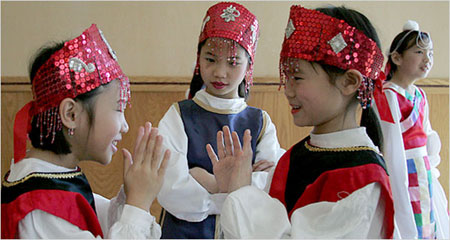Raising a child with roots in China
By ANTHONY RAMIREZ (nytimes)Updated: 2007-02-25 13:34
http://www.nytimes.com/2007/02/25/nyregion/25chinese.html
 Young dancers played before their performance at a Chinese New Year event in Princeton, N.J., that was attended by adoptive families. [Dith Pran/The New York Times] |
He was holding his adopted daughter, Lily Zhong Wei, who will be 3 next month. She was dressed in a red children's version of a cheongsam, the high-collared woman's dress of China.
The Fentons are one of thousands of families who have adopted children from China and brought them to be raised in the United States. As members of a national organization called Families With Children From China, they gather at regular events, but usually for non-ethnic social and educational programs, like picnicking or ice-skating.
Chinese New Year, the two-week celebration that began on Feb. 18, is different. It reminds families of the leap in the dark they took when they chose to adopt a child of a different race and different culture and brought them to America for a challenging role in the modern American family.
On Saturday, a group of those families celebrated at the Super Star East Buffet here with Chinese food (and some macaroni and cheese), as well as Chinese songs, dances, and dress.
Like many of the 50 other couples here, Mr. Fenton and his wife, Trish, have rehearsed "the speech."
At some time, they said, they will sit down with Lily and speak about race and racism and family.
"Lily's not asking questions yet because she's so little," said Mr. Fenton, an accountant who came to the United States in 1995 and now lives in Princeton Junction. The speech, he said, "begins with her asking, ¡®Why do I look different from you?¡¯ We¡¯ve always told her she comes from China but at some point the dime is going to click in, and we¡¯ll just go over it point by point."
Easier rehearsed than done? "Maybe, maybe," he said.
Families With Children From China, which has chapters around the United States, has held meetings with Korean children adopted by Americans and who are now adults. The Korean adoptees emphasized a void in their upbringing: in many cases, their Korean heritage was neglected.
"My takeaway from that was that many of the children who came from Korea grew up Americanized without appreciating their roots," said Fred Bost, 54, an executive with Educational Testing Service here.
He and his wife, Lynn Yokoe, 50, a former executive in children's book publishing, adopted Juliet, 6 ?, and Grace, 4 ?, as infants in China. Ms. Yokoe, who is Chinese and Japanese, is the regional coordinator of the Central New Jersey and Bucks County, Pa., chapter of the families group.
In contrast to the parents of Korean adoptees in the 1960s and 70s, these adoptive parents said they went out of their way to emphasize Asian culture, seeking out communities, like the Princeton area, with large Asian populations and Cantonese and Mandarin language schools.
Most of the children here Saturday had Asian middle names. Jaime Renman, 9, giggled when she forgot how to spell her two Chinese middle names. Her mother, Sandy Renman, 46, a school teacher from Langhorne, Pa., gently helped her spell Jangchun, the name of her town in China, and her family name, Xiang.
Ms. Renman cried when recalling the plane trip from China. "I was taking her from her country," she said.
Ms. Fenton, 46, a former telecommunications executive, said she thought often about her daughter's future. "Does racism worry me, oh sure," she said. "But it seems to me Asian women do pretty well here and hopefully Lily will, too."
Most parents gathered here were unable to have children of their own. They chose to adopt in a foreign country because they heard stories about American adoptions going wrong. And while adoption in China was arduous, it was for the most part well run and, most importantly, unlikely to be reversed by a birth mother's change of heart.
In May, China plans to introduce limitations on foreigners adopting Chinese children, including a possible ban on single parents, those over 50, and others. It reinforces a feeling among parents here that the window for Chinese adoptions may be narrowing, even closing.
As the Chinese become more affluent, they may look on foreign adoptions as exporting their heritage and ban them altogether, said Mr. Fenton.
"In that case," he said, nuzzling Lily's cheek, "we will have been very, very
lucky."
|
||
|
||
|
|